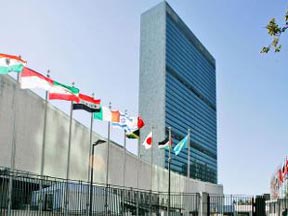 UNITED NATIONS: India was among 119 nations that voted in support of a UN General Assembly resolution granting the right to non-member observer States of Palestine and the Vatican to raise their flags at the world body’s headquarters along side the flags of UN member nations.
UNITED NATIONS: India was among 119 nations that voted in support of a UN General Assembly resolution granting the right to non-member observer States of Palestine and the Vatican to raise their flags at the world body’s headquarters along side the flags of UN member nations.
The resolution ‘Raising the flags of non-member observer States at the United Nations’ was adopted yesterday by a vote of 119 in favor to 8 against, with 45 delegations abstaining.
Voting against the resolution were Australia, Canada, Israel, Marshall Islands, Federated States of Micronesia, Palau, Tuvalu and the United States.
By the terms of that text, the General Assembly decided that the flags of non-member observer States maintaining permanent observer missions at Headquarters shall be raised at Headquarters and United Nations offices following the flags of the Members States of the Organization.
The Assembly took the decision noting the participation of non-member observer States that maintain permanent observer missions at Headquarters, of which there are currently two – the Holy See and Palestine, in its sessions and work.
The text of the resolution also requested Secretary- General Ban Ki-moon to take “the measures necessary” for the implementation of the decision during the Assembly’s 70th session, which begins on September 15, and within 20 days of the adoption of the resolution.
Palestinian UN ambassador Riyad Mansour hailed the “historic vote,” calling it “another step towards fulfillment of the promise of independence made to the Palestinian people nearly seven decades ago.”
Palestine became an observer state in 2012. The Vatican has been a non-member observer state since 1964.
Mansour thanked all Member States who had participated in favor of “this historic vote”.
He said the General Assembly had sent an important message to the Palestinian people at a critical time.
After half a century of occupation, with five million Palestinian refugees in camps, hopelessness was rising but the General Assembly had listened to the appeal of the Palestinian people to fly their flag at the United Nations, he said.
The UNGA’s adoption of the resolution, he added, would restore hope as the people of Palestine continued on the peaceful, non-violent and legal path they had chosen to secure Palestine’s rightful place among the community of nations.
The vote was also a contribution to international efforts to salvage the two-State solution, which had been gravely damaged by the occupying power, he said, adding that the Security Council must not remain paralyzed anymore and should uphold its obligations.
While raising the flag would not end the occupation or solve the conflict immediately, it would signify to Palestinian people everywhere who were watching tonight that the international community supported them.
US Ambassador to the UN Samantha Power, in explaining her vote against the resolution, said her country had long been committed to achieving the peace that Palestinians and Israelis deserved.
A sustainable and just resolution to the conflict would be reached only through compromise negotiated by the parties.
Raising the flag was “not an alternative and would not bring the parties closer to peace,” she said.
While the US voted against the resolution, Power said that was not a vote for the status quo.
Israel’s envoy Ron Prosor said the goal of the resolution was a “photo opportunity”, pursued in contravention of all the established rules and procedures of the United Nations.
He said no vote could turn an empty symbolic gesture into a State and as long as the Palestinians believed they could achieve their political goals without making concessions, they would continue to avoid taking the difficult decisions needed for peace.
“Make no mistake; the goal of this resolution is a photo op. The Palestinians want to bring together world dignitaries and the media to gather around and watch as (Palestinian Authority’s president) Mahmoud Abbas raises a flag. They plan to use the prestige of the UN as a backdrop for this charade,” he said.
He said the vote may serve the interests of Palestinian leaders, but would not help the Palestinian people.–PTI





